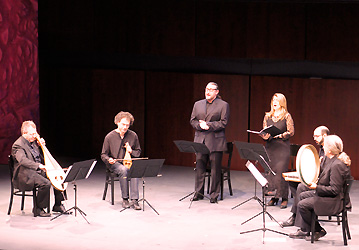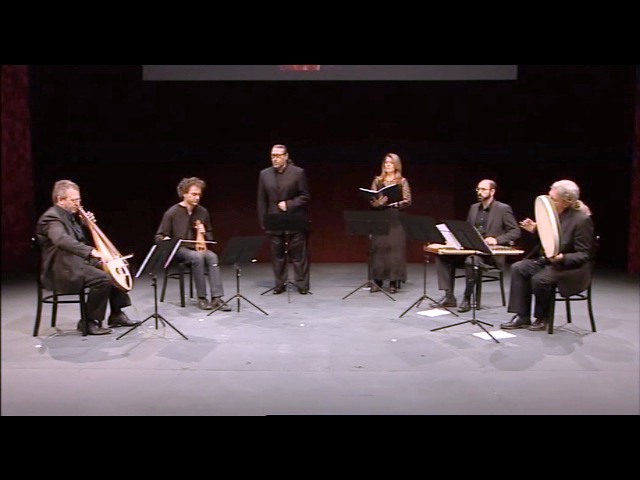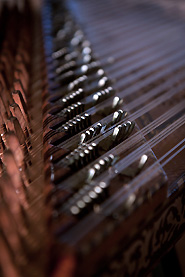Avram Avinu - Our Father Abraham

Religious history
and very human stories,
sung in a spiritual atmosphere
beyond interreligious dispute
Little is known about the historic person Abraham. In the Qur'an, an entire surah is dedicated to Abraham / Ibrahim,
while in the Christian liturgy he appears for the most part only in genealogies and lists of the Patriarchs.
The most extensive description of the first patriarch's long and changeful life and the story of this family is written
in the Book of Genesis.
His life threatened by the tyrant Nimrod, Abraham grows up in a cave. God calls him to Canaan; while in Egypt, he passes
his beautiful wife Sara off as his sister, letting her be lead to the Pharaoh. He wages war against four powerful kings; his slave
and concubine, Hagar, bears his first son, Ishmael. God makes a covenant with him, with circumcision as its token, and promises him innumerable offspring. Three angels are his guests and announce the birth of Isaac by his chief wife, Sara, although the
couple has already reached a truly biblical age. Sara forces him to cast Hagar and Ishmael out. According to the Qur'an,
Abraham, while sending Hagar and Ishmael away, rediscovers the ruin of the Ka'aba near Mecca. They reconstruct the
Ka'aba and thus institute the Muslim pilgrimage to Mecca. On the mountain Moriah, Abraham is willing to sacrifice one
of his sons, the tenth and heaviest trial imposed on him by God. Traditionally, Muslims are convinced that Abraham wanted
to sacrifice his son Ishmael and celebrate in his honor their most important feast day, the Sacrifice festival. For Jews and
Christians, following Old Testament tradition, Isaac is the 'chosen one'. Early on, this was the source of interfaith conflict,
as the Arab peoples and the Prophet Mohammed are descended from Ishmael, the Twelve Tribes of Israel from Isaac and
his son Jacob. In the New Testament, Abraham is part of the genealogy of Jesus.
Thus, each of the three religious families claims «Avraham» ('Father of a Multitude') as their father. God made the Old Covenant
with him. For Paul the Apostle, Abraham is father of the Christians because of his righteousness of faith. From the Book of
Genesis, the Qur'an adopts the descent of the Arabs from Ishmael. The religion proclaimed by Mohammed is consequently
the religion of Abraham / Ibrahim, as Abraham lived his monotheistic faith already prior to the Torah and the Gospel.
Ensemble Sarband sings about the history of this very unique family, which still contains fuel for political conflict as well as the
seed of a new community of religions. Songs for the pilgrimage to Mecca and Sephardic-Jewish ballads, Qur'an recitation and
Early Christian Aramaic hymns flow into a musical ritual, a celebration of the Father of a Multitude.
Reviews
«… For many years now, Sarband have been building breathtaking bridges between cultures and religions ….
Their performances count among the most exciting and beautiful concerts in the entire, extensive Early Music scene …
The texts were not only projected via video, but also illustrated with graphic art. Thus ears, eyes, hearts and minds
of the enthralled audience were equally touched and enchanted.»
Franz Szabo, Kritisches Journal der Alten Musik (Austria), 6-2012
«With this program, Ensemble Sarband - highly praised regular at the Styriarte and Psalm Festival since many years -
enthralled its audience in the List-Halle. Under the artistic direction of Vladimir Ivanoff, the multicultural group performed
with intense focus, depth and vitality … Thus, Ensemble Sarband succeeded in creating what had been announced in the
playbill: art connecting peoples.» Eva Schulz, Kleine Zeitung, 1.7.2012
"Brothers, ardor, ornaments. A virtuoso authenic performance ensemble from four mediterranean countries centered around
German-Bulgarian director Vladimir Ivanoff sketched a colorful, Muslim-Jewish double portrait of the forefather Abraham. …
incredibly sensitive and musical …» Matthias Wagner, Kronenzeitung, 1.7.2012



